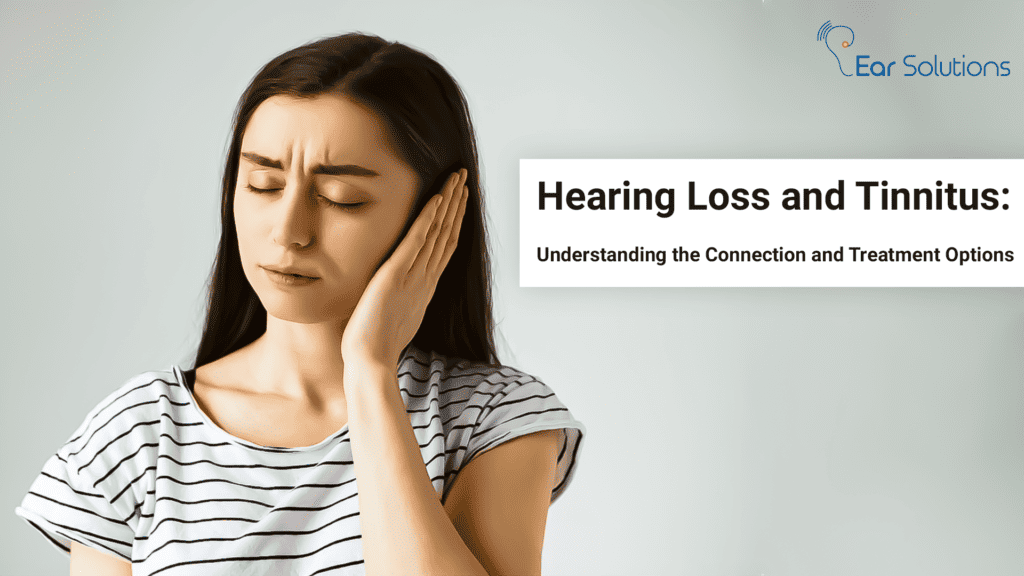Hearing loss and tinnitus are two common auditory conditions that affect millions of people worldwide. While they are distinct issues, they are often interconnected, and individuals with hearing loss may also experience tinnitus. In this blog, we will delve into the relationship between hearing loss and tinnitus, the impact they have on daily life, and the treatment options available to manage these conditions effectively.
Understanding Hearing Loss:
Hearing loss is a prevalent condition characterized by a reduced ability to hear sounds. It can range from mild to profound and can occur in one or both ears. Hearing loss can result from various factors, including aging, exposure to loud noises, genetics, infections, and certain medical conditions. Depending on the type and degree of hearing loss, individuals may have difficulty understanding speech, hearing faint sounds, or experiencing muffled or distorted sounds.

The Connection between Hearing Loss and Tinnitus:
Tinnitus is the perception of ringing, buzzing, hissing, or other phantom sounds in the ears or head, without any external source. While tinnitus is not a disease itself, it is often considered a symptom of an underlying issue, such as hearing loss. The connection between hearing loss and tinnitus lies in the damage or malfunction of the hair cells in the inner ear. These delicate hair cells play a crucial role in converting sound vibrations into electrical signals that the brain interprets as sound. When these hair cells are damaged, as in cases of sensorineural hearing loss, they can send irregular electrical signals to the brain, resulting in the perception of tinnitus.
Impact on Daily Life:
Hearing loss and tinnitus can significantly impact an individual’s quality of life. Hearing loss can lead to communication difficulties, social isolation, and reduced participation in daily activities. It can also affect relationships, work performance, and overall emotional well-being. Tinnitus, on the other hand, can be distressing and disruptive, causing stress, anxiety, and sleep disturbances for those who experience it.
Treatment Options:
While there is currently no cure for tinnitus, there are several treatment options available to manage its symptoms effectively. One of the most common approaches is sound therapy, where soothing sounds or white noise are used to distract from the perception of tinnitus and provide relief. Sound therapy can be delivered through hearing aids or wearable sound generators, helping individuals habituate to tinnitus and reduce its perceived loudness and annoyance.

For individuals with hearing loss and tinnitus, hearing aids for tinnitus can be a valuable dual-purpose tool, effectively addressing both conditions. Hearing aids amplify external sounds, making them audible to the individual with hearing loss, and also include sound therapy features to manage tinnitus. By enhancing overall auditory perception and providing a distraction from tinnitus, hearing aids can significantly improve communication and quality of life for those with these co-existing conditions.
Cognitive behavioral therapy (CBT) is another effective treatment option for managing tinnitus-related distress. CBT helps individuals develop coping strategies and change negative thought patterns associated with tinnitus, reducing the emotional impact of the condition.
Additionally, incorporating lifestyle adjustments such as stress management, regular exercise, and healthy sleep habits can further support the management of both hearing loss and tinnitus.
Conclusion: Hearing loss and tinnitus are complex auditory conditions that can have a profound impact on a person’s well-being. Understanding the connection between hearing loss and tinnitus and seeking appropriate treatment is essential for better hearing health. If you suspect hearing loss or experience tinnitus symptoms, consult with a qualified audiologist or hearing care professional. Early intervention, proper management, and the use of hearing aids or sound therapy can empower individuals to regain control over their hearing and reduce the impact of tinnitus, allowing them to embrace a more fulfilling and connected life.




